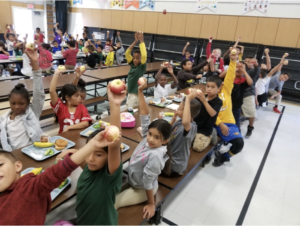Farm to School programs are popping up across the nation! Communities see the educational and nutritional values of providing fresh and local food for students and the economic benefits to supporting local farms. This gives farmers the opportunity to contribute to a positive movement by selling directly to schools, while simultaneously expanding their market and revenue streams. School customers tend to pay slightly more than large-scale wholesale for slightly lower volumes while providing more consistent purchasing relationships than chefs at restaurants, making them a more accessible wholesale market channel for small farmers.
When selling directly to school districts, farmers should keep in mind that schools have certain characteristics that make them different buyers from wholesale, farmers market, retail, or restaurant buyers. School districts tend to provide farmers with higher prices than wholesale and lower prices than CSAs and Farmers Markets, but the advantage is that school districts tend to buy higher volumes. School districts may be willing to negotiate prices for micro-purchases based on quality, volume, delivery time, educational opportunities, and promotions. School district buyers have varying budgets, local goals, delivery locations, and processing capabilities. Keep this in mind when communicating with the school district nutrition services department.

Another thing to consider is that some products are more popular with children. Newer farm to school programs will likely start with whole fruits that you can eat with your hands without chopping (“hand fruits”), such as apples and oranges, depending on the season. More developed farm to school programs may be interested in vegetables and herbs, such as broccoli, carrots, and parsley, as they require preparation and proper facilities to be in place. Additionally, the school district calendar and timeline should be considered when selling to schools. School district child nutrition programs operate from August-June, with very little purchasing happening over the summer, during the first and last month of the school year, and during holiday breaks. Some school districts run summer meal programs and plan for Farm to Summer events and local purchasing. When contacting a school food service department, ask them if they intend to make any local purchases over the summer.
Another method of selling to school districts is to sell through a food hub. Aggregators provide farmers with opportunities to sell smaller quantities to schools. Food hubs also provide farms with infrastructure and support including distribution and delivery, educational materials for schools, warehousing/storage, and invoicing support. Food hubs provide farmers with access to school markets without having to deal with many of the logistical challenges of selling to schools.
Whether selling directly to schools or selling via a food hub, farmers will find that schools provide a unique market that can not only benefit farmers, but also benefit students and the local community.



